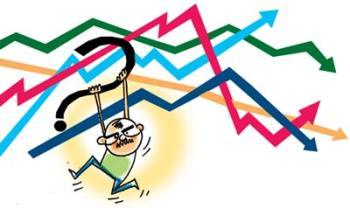
Procrastination is a bad habit of putting off until the day after tomorrow what should have been done the day before yesterday' said Napoleon Hill an author, journalist, attorney and lecturer. He also wisely said 'Don't wait, the time will never be right'.
Isn't this so true when it comes to making financial decisions?
How many of you have developed the habit of postponing things because you feel the time is just not right or at times you are too busy or just plain lazy? I guess most of us. Anyone saying that s/he have never postponed important work until the next day are lying. Just as a minor health problem if neglected could becomes chronic diseases, financial decisions if postponed can take their own toll on your finances at a later stage.
The cost of procrastination cannot be calculated in certain situations but what can be quantified to some extent is the cost of delaying your financial decisions: be it paying bills or investing for your future.
Without any further delay, let us click NEXT to have a look at the areas in which the cost of procrastination can cost you dearly.
The author is a certified financial planner and can be reached at dhanplanner@rediffmail.com.

Today everyone is leading a fast life. Especially individuals living in metro cities are always short on time. So either you are too busy to pay your bills or too lazy. Meet Rajiv Gupta, a 31-year-old executive in a pharmaceutical company who travels all the time.
He uses credit cards for all his official and personal expenses. Official expenses are reimbursed from the company. But, lack of time and tardiness in filing the bills with his company leads to late reimbursements and in the end, the bill being paid late.
And everybody knows about the perils of credit cards. Late payment means penal charges.
At times when he is traveling, he would roll over his bill payment to the next month. Hence interest is charged which comes to almost 2.5 per cent per month. Today, his dues have risen to such an extent that recently he took a personal loan just to clear one credit card dues.
He still has two credit cards outstanding left. So he is paying the interest on his credit card at 2.5 per cent per month plus the interest on the personal loan which comes to around 15 per cent. All his hard earned money ends up servicing his credit cards and personal loan.
As he himself says, "With just proper management, I could have saved myself from such a doomed scenario."

Oh no, again that time of the year when you have to sit and prepare your accounts in order to file your taxes.
More boring or cumbersome the task, more the tendency of an individual to postpone it!
While July 31 is the last date for filing returns for the individuals any delay in doing that can make you pay penal interest of one per cent for every month of delay or part of the month from the due date of filing returns to the date of furnishing the returns.
The interest is calculated on the tax amount of the total assessed income after all the deductions as well as reduced by advanced tax paid and any tax deducted at source.
Although you might think that one per cent is not much but why pay that extra amount from your hard earned money.

The fact remains that just as delay in paying for your credit card can cost you a lot, a delay in investment decision can also cost you a lot. How? Let us have a look:
Shalini Parmar started investing Rs 5,000 every month through systematic investment plan (SIP) of a good equity diversified fund when she was 30.
She invested this amount every single month till she turned 50.
But interestingly even after stopping the SIP she left her corpus in the fund to grow for another 10 years.
Ankush Joshi, on the other hand, started investing Rs 10,000 every month after he turned 40 and continued investing the same amount for the next 20 years.
At 60 both of them decided to withdraw money. The table along side shows how their money grew during the period.
* The annual rate of return of 10 per cent is on the conservative side. If invested in a good equity diversified fund for long term, that is, for 8 to 10 years you can expect to earn an annualised return of 13 per cent.

Individuals without proper financial management have always faced problems. Just as small savings add up to big amounts small costs add up to big ones that you do not even realise until you have to make the payment. Let us have a look at some of the points that individuals can manage in their day-to-day life in order to avoid such small costs.
Keeping track of your bank accounts
Many individuals have more than two bank accounts and to keep a track of them at times become difficult. Many times the stipulated quarterly balance is not maintained in an account and it can lead to charges. You do not realise this till the time your bank sends you a notice. Hence, keep a tab of all your accounts and close all unnecessary bank accounts.
Inadequate insurance
These can cost you dearly as well. If you are not properly insured then in case of your death your dependents may be left with inadequate sum to support them. Or in case of health insurance as in case of a major illness you will have your pockets empty fast if you are not covered adequately.
Good book keeping
This refers to proper maintenance of records of all your finances. For example, bank statements. In case you do not have bank statements for a particular month which you may want later for some purpose, many a banks will charge you for the same if the statement you want is more than six-month old.
Reading fine prints
Many individuals do not look at their bill statements when they are delivered to them. Many a times your credit card bills have certain amounts that are billed twice which you might overlook unless you check them before paying. Do look at all the bill statements that come your way in order not to overpay.
Also, while signing any contract, be it for insurance or any other financial transaction, read the fine print carefully so you do not feel duped later.
Delay in paying your insurance premium
Take for example health insurance. If not renewed every year on time your policy may lapse. To get a new policy post 50 is a big headache plus you will end up paying a higher premium amount plus you may lose your no-claim bonus. Add up the cost and you would never delay the payment of your insurance policies.
Delay in depositing your cheques
Check for those small-amount cheques that may just be lying in your drawer for months together. One fine day, you discover them with luck but it is over six months and there is no point in depositing them as they will have lapsed by then. Though a small amount it is still a financial loss.
The list can go on and on. The important thing is to not delay financial decisions and discipline yourself so that you don't end up paying a huge cost for your financial procrastination.